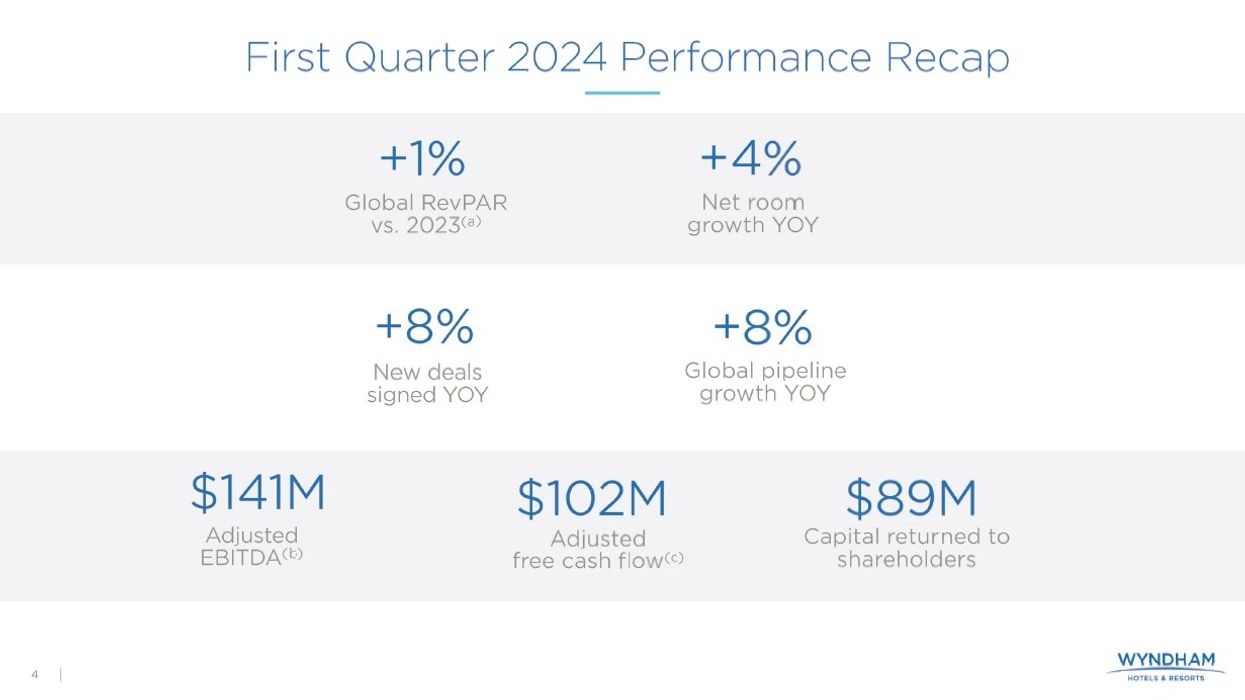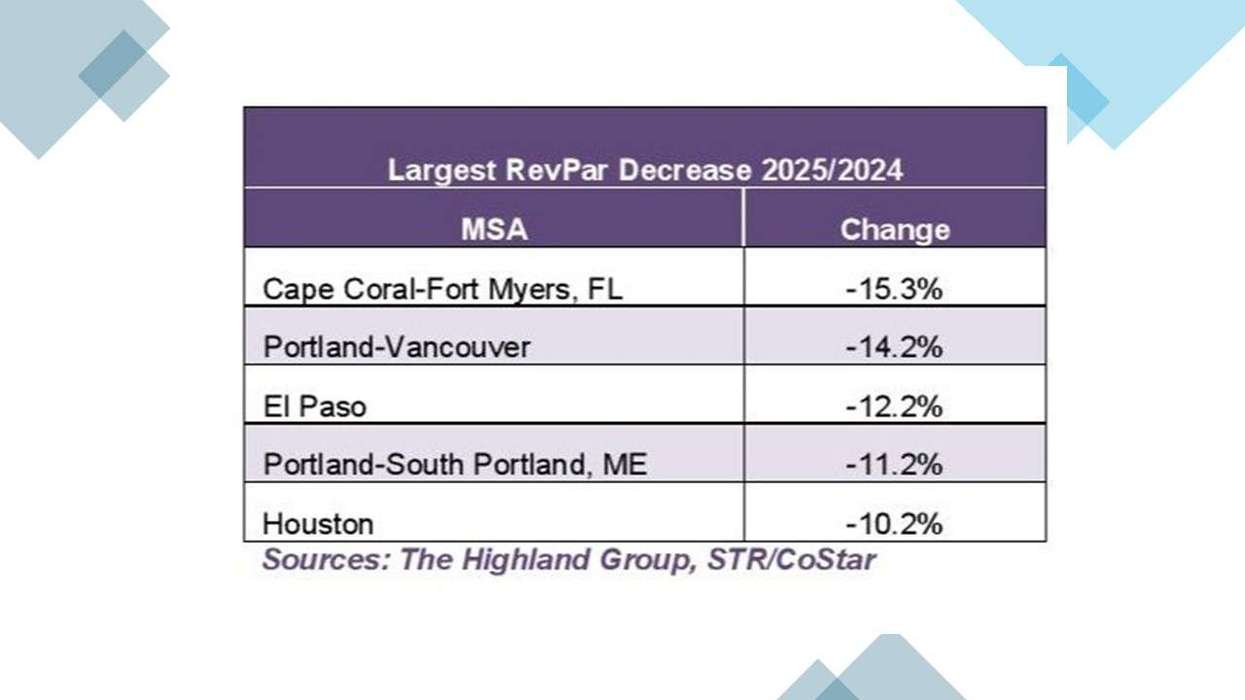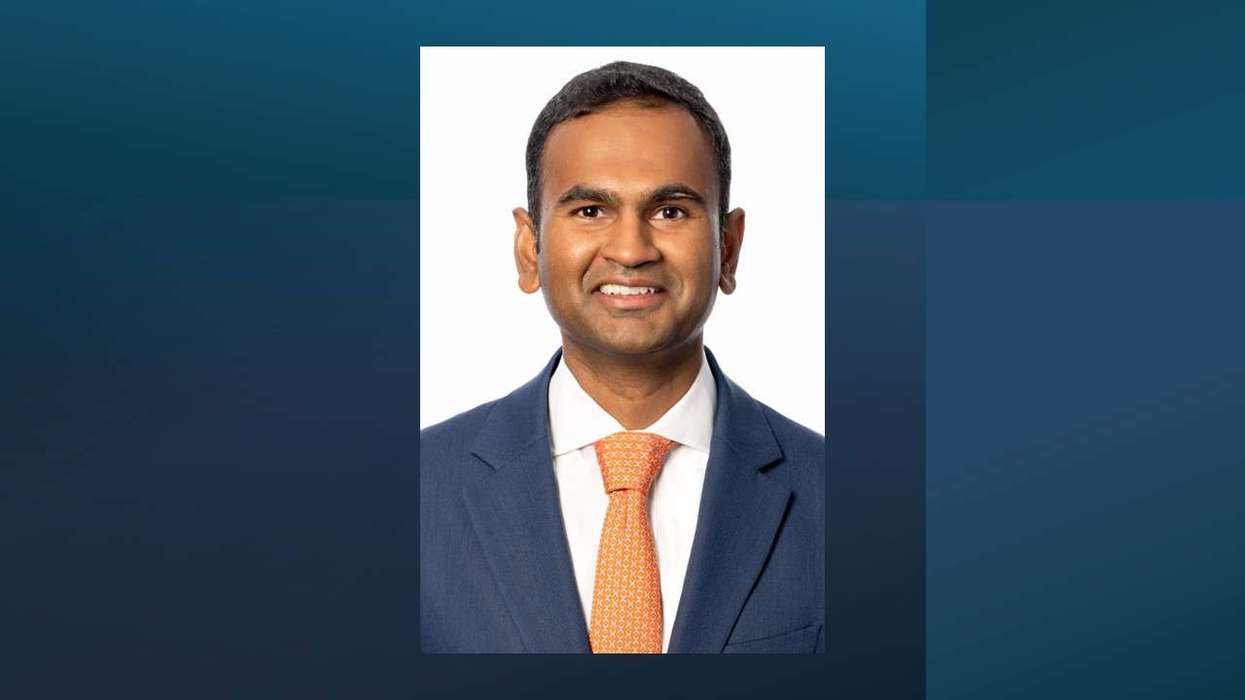WYNDHAM HOTELS & RESORTS reported a net income of $16 million for the first quarter ending March 31, down from $67 million in the same period of 2023. The decrease primarily resulted from transaction-related expenses due to an unsuccessful hostile takeover attempt by Choice Hotels International, Wyndham said in a statement.
The company’s global development pipeline rose 8 percent to reach a record 243,000 rooms and nearly 2,000 hotels, the statement added. The company opened 13,000 rooms, showing a 27 percent year-over-year increase. This achievement signifies the 15th consecutive quarter of sequential pipeline growth.
“We’re thrilled to announce another strong quarter of progress in our executions, openings, franchisee retention and net room growth around the world,” said Geoff Ballotti, Wyndham’s president and CEO. “Increased interest from hotel owners in our brands has propelled our development pipeline to a record 243,000 rooms, marking an impressive 8 percent increase. Our strong balance sheet and cash flow generation capabilities provide significant opportunity to continue to enhance returns to our shareholders over both the short and long-term, as evidenced by our board of directors’ approval of a $400 million increase in our share repurchase authorization.”
The company entered the upscale extended stay segment through a deal with WaterWalk Extended Stay by Wyndham.
Other key highlights include:
- Improved global retention rate by 30 basis points year-over-year on an LTM-basis to 95.6 percent.
- Secured 171 contracts for legacy brands, reflecting an 8 percent increase year-over-year.
- Returned $89 million to shareholders through $57 million of share repurchases and quarterly cash dividends of $0.38 per share.
- Increased share repurchase authorization by $400 million.
RevPAR trends
Wyndham's global system expanded by 4 percent, with 1 percent growth in the U.S. and 8 percent growth internationally, the company said. These figures align with expectations, driven by robust growth in the higher RevPAR midscale and above segments in the U.S. and a 3 percent increase in the direct franchising business in China, along with 13 percent growth.
RevPAR increased by 1 percent in constant currency compared to 2023, driven by a 5 percent decrease in the U.S. and a 14 percent international growth. The company faced its toughest year-over-year comparisons in the U.S. during the first quarter, resulting in a 440 basis points decline in occupancy and a 50 basis points decrease in ADR.
Wyndham saw year-over-year RevPAR growth in all other regions globally, primarily due to sustained pricing strength, with ADR increasing by 12 percent and occupancy rising by 2 percent, the statement said.
Revenues sink
Wyndham’s $51 million decline in net income YOY in the first quarter is mainly due to transaction-related expenses resulting from the unsuccessful hostile takeover attempt by Choice Hotels, the company said. Other factors included an impairment charge primarily related to development advance notes and higher interest expenses.
Adjusted EBITDA was $141 million compared to $147 million in Q1 2023. Excluding a $10 million impact from marketing fund variability, adjusted EBITDA grew 3 percent, reflecting improved expense timing.
Diluted earnings per share decreased to $0.19 from $0.77 in Q1 2023, driven by lower net income, partially offset by share repurchase benefits. Adjusted diluted EPS was $0.78 compared to $0.86 in the first quarter of 2023, with a $0.09 per share impact from expected marketing fund variability. Adjusted diluted EPS increased 1 percent year-over-year, with EBITDA growth and share repurchase benefits offset by higher interest expenses.
Wyndham’s fee-related and other revenues totaled $304 million, down from $308 million in the first quarter of 2023. This decline was attributed to a $5 million decrease in royalty and franchise fees, partly offset by an 8 percent increase in ancillary revenue streams.
The decrease in royalties and franchise fees was primarily influenced by the decline in U.S. RevPAR and the comparison with the company's highest quarter of other franchise fees, partially offset by global net room growth and increased international RevPAR.
Marketing fund expenses exceeded revenues by $14 million in the first quarter of 2024, in line with expectations, compared to $4 million in Q1 2023. The company anticipates balancing marketing fund revenues and expenses for the full-year 2024.
2024 outlook:
- YOY rooms growth: 3 percent-4 percent
- YOY global RevPAR growth: 2 percent-3 percent
- Fee-related and other revenues: $1.43 billion-$1.46 billion
- Adjusted EBITDA: $690 million-$700 million
- Adjusted net income: $341 million-$351 million
- Adjusted diluted EPS: $4.18-$4.30
Hilton Worldwide Holdings posted a $268 million net income in the first quarter of this year, with a 2 percent increase in system-wide comparable RevPAR compared to the first quarter of 2023. The company's fee-based model and strong development efforts fueled performance, showing steady progress in signings, starts, and openings, indicating a robust pipeline.






